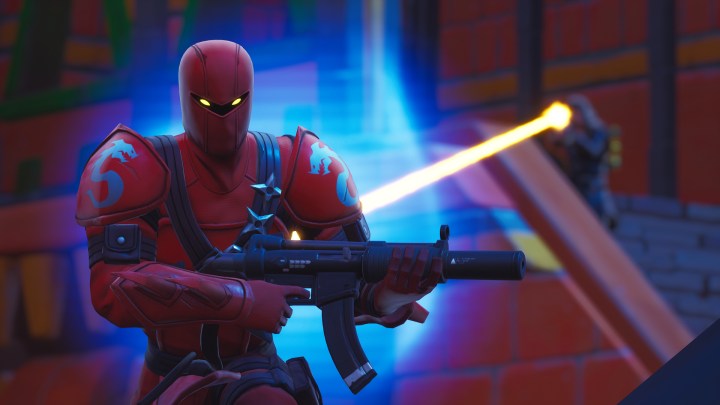
Fortnite is back on top, and it only took a fortnight.
The surprise launch of Apex Legends was a hit. The free-to-play battle royale set in the world of Titanfall was the shiny new toy everyone couldn’t stop talking about. And for a moment there, it even stole the spotlight away from the genre’s heavyweight champion, Fortnite.
Apex Legends was swimming in praise. A self-proclaimed evolution to battle royale, Apex was changing the formula with its charming selection of Legends, respawn mechanic, and clever ping system. It became crystal clear that the battle royale fad was far from finished and some even suggested that this was the beginning of the end of Fortnite.
Behind the scenes, though, Fortnite went into overtime. For the first time ever, players were given a set of Overtime Challenges to complete while Epic Games worked on the delayed launch of Season 8. Two weeks later, the Season 8 update went live and it arrived with new limited-time modes, loads of map changes, and a whole lot of pirates.
The most interesting additions to most, however, are the ones that seem to have taken direct inspiration from Apex Legends. An improvement to the World Marker tool now works exactly like the ping system from Apex Legends. The Season 8 Battle Pass tier 100 skin looks eerily like Lifeline, and mysterious vans appearing around Fortnite’s Replay Mode have reportedly been linked to its own version of a respawn point.
Everyone does it
Just like that, Fortnite was back on top — though if you’ve been paying close attention, this won’t come as a surprise. Epic Games has a reputation for adding good ideas from other games to Fortnite, and in doing so has mastered the art of staying relevant and ahead of its competitors.
Following a luke-warm launch with its Save the World mode, Fortnite quickly changed its tune to match that of PlayerUnknown’s Battlegrounds by launching its own battle royale. To the disappointment of PUBG, Fortnite: Battle Royale took off like wildfire prompting the company to sue for copyright infringement, although the lawsuit was later withdrawn.

Since then, Fortnite has received criticism for its unabashed implementation of content and features from other games, but it isn’t the first or the only game to do it. Apex Legends’ hero-based battle royale arrived first in Hi-Rez Studio’s Realm Royale (a spinoff of Paladins that takes heavy inspiration from Overwatch). Call of Duty’s Blackout bears a striking similarity to both PUBG and Fortnite, and even PUBG is linked to H1Z1 and Arma’s own battle royale mode and mod.
This form of imitation is neither new or surprising, as with every great idea comes a slew of imitators who want to cash in. Yet Epic Games is incredibly good at what it does with Fortnite, and other developers could learn a thing or two from it.
Adapt or die
Epic Games wants its players to keep coming back and it will do damn near anything to ensure that it happens. On top of its aggressive imitation streak, Fortnite offers biweekly patch notes and content updates, seasonal map changes, a subscription that rewards faithful players with exclusive content, and interactive events that keep them on their toes. The speed at which it changes exhausts even dedicated players.

Meanwhile, Call of Duty’s Blackout community remains disgruntled with every new update as the game’s developer, Treyarch, struggles to juggle three separate online multiplayer experiences, and PUBG’s updates have only just started focusing on the game’s build stability and quality after being out for nearly two years. Fortnite has a clear advantage. Being built on a home-brewed game engine makes it easier to tackle issues and present new content that much faster.
Epic’s ability to adapt at the drop of a dime, and do it well, is how it stays ahead of its competitors. Developers don’t have to break their necks to push out updates, but a meaningful, reliable content plan can keep players engaged and help build a loyal community.
The success of Apex Legends is a great example of that. While still new to the battle royale landscape, it’s already avoiding the missteps of its predecessors by adopting a content approach comparable to that of Fortnite and releasing a complete year one roadmap with a Battle Pass plan starting just one month after its launch. Better yet, rumors of a new Legend that resemble a character out of Gearbox’s Borderlands 2 have its players just itching for the first content update.
I’m not sure if Fortnite’s history of swiftly adopting popular mechanics from other games makes it any more guilty of it than its peers (though its dance emotes certainly don’t help its cause), but I do know that it’s changing how players choose which online games they invest time into. With shameless iteration and a deliberate content strategy, Fortnite is building its own legacy.
Editors' Recommendations
- This great indie is a loving homage to the worst Nintendo games of all time
- Fortnite is getting a Disney universe made by Epic Games
- Rock Band 4 gets its final piece of DLC next week after over 8 years of support
- Fortnite’s new modes are fun, but don’t sleep on Battle Royale’s great update
- Fortnite Festival will leave you wishing for a real Rock Band revival






